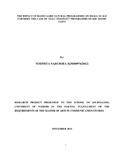| dc.description.abstract | Kenya‘s economy is dependent on agriculture supported by small scale farmers. The sector
provides a livelihood for about 80% of Kenya‘s population and employs more than 70% of the
rural population. Communicating information on agriculture innovations to farmers has relied on
extension services which limits the number of farmers reached. This study sought to assess the
impact of agricultural radio progammes in responding to farmer information needs with specific
reference to Mali Shambani a radio programme broadcast on KBC Radio Taifa.
Radio remains the most cost effective means of building awareness, and supporting the adoption
of new farming practices by small scale farmers. Although radio is the most popular mass
medium, agriculture programming is executed with little participation from the farmers and
extension agents. Broadcast media houses hardly undertake surveys for agricultural programmes
to find out the effectiveness of the programmes aired. This study therefore provides an insight
into best approaches to agricultural programming for radio stations and stakeholders in the
agriculture sector.
According to the agenda setting theory, media often set the agenda for the public by highlighting
what they deem important by telling people what to think about. This research project applies
agenda setting theory to show how the selection of topics and packaging of agricultural content
impacts on farmers‘ uptake of agriculture innovations. To establish this, the researcher used a
mixed method for data collection, both qualitative and quantitative. A total of 31 respondents
were interviewed using purposive sampling, 13 in Tongareni Sub-county of Bungoma County.
The other 18 were selected from the Mali Shambani feedback data base of participants of the live
show. The 18 listeners were drawn Western, Nyanza, Eastern, Coast, and Central Kenya.
The research findings indicate that agricultural knowledge is essential for increased productivity
and that radio is the preferred medium for small scale farmers and extension experts in sharing
information on agriculture innovations. Radio agriculture programmes alone cannot bring about
change in the farming communities, there is need to integrate participatory models to serve rural
farming communities effectively. Mali Shambani was found to use a top down approach with
minimal participation from farmers mostly the youth and women.
Based on the findings the researcher recommends that broadcast media organizations invest in
innovative and participatory approaches to agriculture programming for sustenance. This would
attract listenership and increased level of awareness and agricultural productivity leading to
increased revenue for the stations from the partnerships | en_US |

